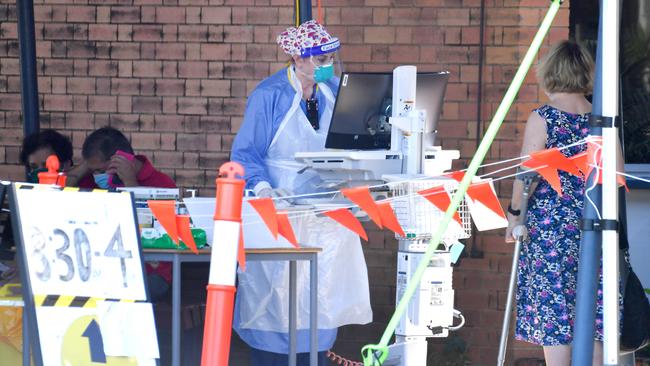Westpac: Consumer confidence declines by 2 per cent despite Omicron outbreak
Westpac’s key monthly survey reveals sentiment fell less than feared in January, with states previously untouched by Covid hardest hit.

The Omicron outbreak has failed to hurt consumer confidence as much as prior Covid-19 strains, with Westpac’s sentiment index falling 2 per cent in January.
The bank’s survey found consumer confidence remained relatively robust at 102 points in the month — still in positive territory despite the outbreak, although down from 104.3 points in December 2021.
Westpac chief economist Bill Evans said the fall was surprising and far smaller than the 5.2 per cent drop in the first months of the Delta outbreak in NSW or the 6.1 per cent drop as Victoria was hit by its second wave outbreak in 2020.
“The 2 per cent decline in the headline index essentially means this regular lift failed to materialise in 2022,” Mr Evans said.
“While the January sentiment result was resilient overall, responses over the course of the
survey week – from January 10 to January 14 – did show a deterioration suggesting some
increased anxiety as the week progressed.”
The worst fall of the pandemic came in early 2020 when consumer sentiment fell 17.7 per cent.
However, Mr Evans noted that the January sentiment was notable in that it did not rise, which typically happens.
Westpac’s data comes after ANZ posted its largest fall since 1992 in that bank’s consumer confidence survey on Tuesday.
But Westpac’s data shows a different story between the states.
Confidence actually lifted in NSW by 1.7 per cent and Victoria by 4.1 per cent according to Westpac despite the Omicron outbreak.
But West Australia saw consumer confidence savaged by 5.1 per cent, followed by South Australia, down 3.9 per cent, and Queensland, where it slid 2.7 per cent.
Mr Evans said the difference in state data was due to prior experience.
“Consumers in states impacted by ‘Delta’ lockdowns appear to have been less unsettled by the rapid spread of the omicron variant than those in states experiencing their first major wave of Covid infections,” he said.
Westpac data showed the near term expectations for consumers had the biggest fall, with views on economic conditions in the next 12 month down 9.6 per cent, in what Mr Evans called a “a swing from cautious optimism to cautious pessimism”.
However, the data also signals resilience in consumer balance sheets, registering consumers reporting an improvement in their finances, up 7.5 per cent.
Mr Evans said this reflected a combination of improving incomes, partly driven by rebounding labour markets, as well as wealth gains from housing and the accumulation of savings due to lockdowns over the past two years.
“The latter, estimated to be worth around $250bn, may now be providing consumers with comfort given the return of virus disruptions,” Mr Evans said.
“These savings will also be important when the omicron threat eases, providing the basis for a strong rebound in spending.”
However, looming interest rate rises are crimping comfort around the housing market for many owners and would-be-buyers.
Most Australians still expect price rises in the next year, but expectations have declined in all eastern states.
NSW saw a 2.3 per cent fall, followed by Queensland with an 8.5 per cent fall in price growth expectations, and Victoria with 10.8 per cent.
Westpac noted property investors saw a significantly larger decline in expectations, down 12 per cent.



